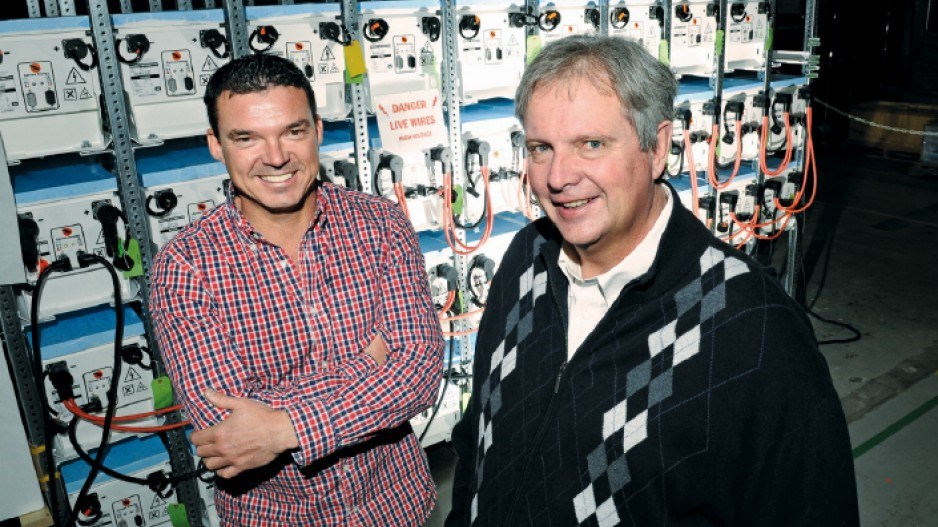It sounds like an overnight success story. Corvus Energy formed just three years ago and is already on track to do $60 million in sales in fiscal 2013, has a headcount of 50 locally, 20 more internationally, and has just created a new joint-venture company in Africa.
But there is a back story to Corvus’ remarkable success that dates back to the 1970s, when Vancouver scientists and entrepreneurs began creating an industry based on rechargeable lithium batteries, spawning several leading battery developers, like E-One Moli Energy (Canada) Ltd.
Even hydrogen fuel cell innovator Ballard Power Systems (TSX:BLD) has its roots in lithium battery technology.
Vancouver’s lithium legacy is partly why Corvus’ founders chose Richmond to build a new company that makes industrial-scale lithium polymer batteries.
“Vancouver has been at the leading edge of the development of lithium forever, and that’s one of the reasons we started the company here – because this is a pretty deep resource base for battery skills,” said Corvus CEO Brent Perry.
“Basically, the whole technology started in Vancouver in the early ’70s.”
B.C.’s cluster of lithium battery innovators includes E-One Moli, Delaware Power Systems and BlueStar Battery Systems International Corp., which was created when Ballard sold its lithium battery division. BlueStar was later acquired by the American firm EaglePicher, which still runs Canadian division EaglePicher Medical Power in Surrey.
“If you look at the industry, you’ll see expatriates all over the globe who used to work here in Vancouver,” said Corvus CTO Neil Simmonds.
Corvus was formed when Perry – who was in the boat-building business – started getting requests from the marine industry for heavy-duty batteries to reduce fuel costs and greenhouse gas emissions in the marine industry.
Until recently, rechargeable lithium ion batteries (sometimes shortened to Li-ion) did not have the energy densities needed for industrial scale uses. Perry teamed up with Simmonds, who holds 70 battery-related patents, to build large Li-ion batteries with sufficient storage capacity and output to power a ship.
Corvus recently signed two contracts, worth $4 million, to provide the batteries for two electric ferries in Norway.
It’s also providing 16 batteries for a hybrid locomotive being built by Alternative Motive Power Systems, which will allow trains to operate without producing emissions while moving rail cars indoors or through sensitive areas.
The marine industry – tugboats, ferries, submarines – are the company’s primary market, followed by electrical storage systems for renewable energy, like wind and solar, and backup power. But Perry expects the trucking industry will be the next big market.
Long-haul semi-truck drivers are required by law to take breaks of eight to 10 hours, depending on the jurisdiction. But they continue to burn diesel all night to provide heat or air-conditioning and lights for their sleeper cabs.
Corvus developed a power system that will allow the engines to be turned off, which will reduce a significant amount of CO2 emissions from idling.
“The trucking industry is going to be a very big business for us,” Perry said. “That will grow into about $200 million a year worth of product.”
And just last week, Corvus struck a joint partnership with Green Park Management Ltd. in Nigeria to create Corvus Energy Africa Ltd., which will manufacture Corvus batteries for backup power in a country where electricity is dirty (diesel-generated) and unreliable.
“From a business perspective, it’s very significant because it’s applicable to virtually any location around the world where they have a community running diesel generators,” said Corvus director of marketing Grant Brown. •
U.S. astronauts rely on Maple Ridge batteries
Every time an American astronaut goes for a spacewalk, his ability to breathe, stay warm and communicate depends on a battery made in Maple Ridge.
E-One Moli Energy (Canada) Ltd. designed and built the rechargeable lithium ion battery used to power the spacesuits astronauts wear.
Interesting as that may be, it’s a small part of the company’s business, the mainstay of which is military applications, such as rechargeable batteries for walkie-talkies.
Incorporated in 1977, Moli Energy once employed 400 people in Maple Ridge and was the world’s first and largest manufacturer of rechargeable lithium batteries.
It was originally owned by Teck Resources Ltd. (TSX:TCK), whose assets include molybdenum – a metal once used in the first generation of rechargeable batteries.
The company was bought out by Nippon Electric Company in 1990 and then merged with a Taiwanese company to form E-One Moli Energy in 2000.
Moli Energy’s biggest market for rechargeable batteries was originally electric cars. While it continues to make batteries for Fisker and BMW, the company diversified into other applications, like power tools, military radios and backup power for telecoms and data centres.
“Everybody got on the electric vehicle bandwagon, and it didn’t really take off,” said Paul Craig, director of technology for E-One Moli in Maple Ridge.
“That electric vehicle technology is being used in stationary power, in the interim, until the electric vehicle industry finally decides what it’s going to do, and then everybody will jump back on that bandwagon.”
Today, the Maple Ridge division’s 70 scientists and engineers focus exclusively on research and development, with most of the manufacturing done in Taiwan.




